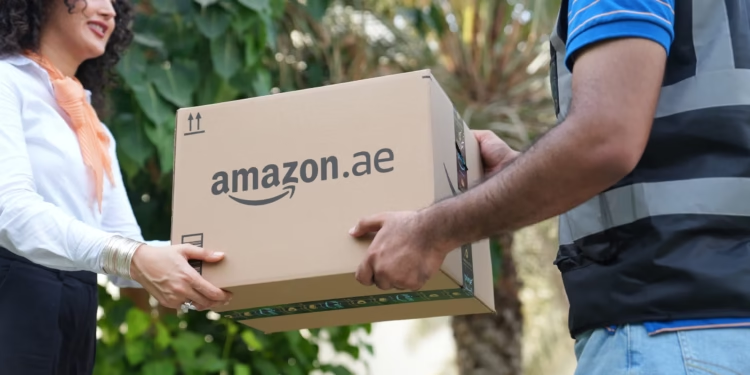Dubai just opened a fresh path to earning money that requires nothing more than comfortable shoes and spare time. The emirate launched its first on-foot package delivery program through a partnership between Dubai Future Foundation and Amazon UAE, creating new income opportunities while tackling traffic and emissions.
The pilot program lets residents and small business owners deliver Amazon packages by walking in densely populated neighbourhoods across Dubai. Instead of waiting for delivery vans to navigate crowded streets, customers will receive their orders from local walkers who can move faster through busy areas.
Amazon Partners with Dubai’s Innovation Hub
This initiative emerged from Amazon’s entry into Sandbox Dubai, the emirate’s regulatory testing ground for future business models. Crown Prince Sheikh Hamdan bin Mohammed bin Rashid Al Maktoum approved Amazon’s participation in the Gig Economy sector of this program, designed to reshape how Dubai approaches flexible work arrangements.
Ronaldo Mouchawar, Vice President of Amazon Middle East, Africa, and Turkey, emphasized the company’s commitment to creating new possibilities that boost entrepreneurship and economic growth. The partnership demonstrates how global tech companies can adapt their operations to local innovation frameworks while serving customers more efficiently.
The program targets people looking for flexible income streams during their free hours.
Dubai’s Economic Strategy Gets a Gig Economy Boost
Sandbox Dubai operates as a key component of Dubai’s Economic Agenda D33, an ambitious plan to double the emirate’s economy by 2033 and establish it among the world’s top three economic cities. The initiative provides a controlled environment where companies can test new business models under adaptive regulatory supervision.
His Excellency Khalfan Belhoul, CEO of Dubai Future Foundation, highlighted how this collaboration represents effective public-private partnerships in developing legislative frameworks that support innovation. The foundation sees this as a stepping stone toward creating more comprehensive gig economy regulations.
The Gig Economy Sandbox specifically addresses Dubai’s need for flexible employment models that can adapt to seasonal demand in retail, hospitality, and tourism sectors. Current regulations limit gig work opportunities, but this pilot tests how expanded frameworks could empower both businesses and workers.
Environmental Benefits Drive Delivery Innovation
The walking delivery model addresses two major urban challenges: traffic congestion and carbon emissions. The program contributes to Dubai’s sustainability goals while potentially speeding up last-mile delivery times, by reducing dependency on delivery vehicles in crowded areas.
On-foot deliveries eliminate fuel consumption and vehicle emissions for short-distance packages, making the delivery process more eco-friendly in high-density neighbourhoods.
The program targets specific geographic areas where walking proves more efficient than driving. Dense residential communities, shopping districts, and areas with limited parking access benefit most from this delivery approach.
How the Program Creates New Income Streams
Dubai residents can earn additional income during their spare time without committing to full-time employment contracts. The flexible structure allows people to integrate delivery work around their existing schedules, whether they’re students, part-time workers, or business owners with variable hours.
Small business owners particularly benefit from this model, as they can utilize slow periods to generate revenue through delivery services. The program helps people maximize their earning potential during traditionally idle hours while contributing to Dubai’s growing gig economy sector.
The initiative also creates opportunities for people who prefer active work over sedentary jobs. Walking deliveries provide physical activity while earning money, appealing to residents who want to combine fitness with income generation.
Testing Ground for Future Work Models
Sandbox Dubai’s regulatory approach allows real-world testing of employment models that traditional frameworks cannot accommodate. The platform collects data on how gig economy initiatives perform in practice, informing future policy decisions based on evidence rather than theoretical models.
This pilot program serves as a template for other industries seeking to implement flexible work arrangements. Success here could encourage similar initiatives in food delivery, retail support, and service sectors throughout the UAE.
The program’s outcomes will influence how Dubai develops comprehensive gig economy regulations. Data from this pilot helps regulators understand the practical challenges and benefits of on-demand work models in the local context.
What Comes Next for Dubai’s Gig Economy
While signup details haven’t been released yet, the program represents the first of potentially many gig economy initiatives under Sandbox Dubai. Amazon currently operates its Delivery Service Partner program for entrepreneurs wanting to launch delivery businesses, but this walking program specifically targets individual gig workers.
The success of this pilot could accelerate the development of Dubai’s broader gig economy framework. Other major companies may follow Amazon’s lead in testing innovative employment models within the Sandbox Dubai environment.
Dubai’s approach positions the emirate as a regional leader in adapting to changing work patterns. The combination of regulatory flexibility and major corporate partnerships creates an environment where innovative employment models can develop and scale effectively.














